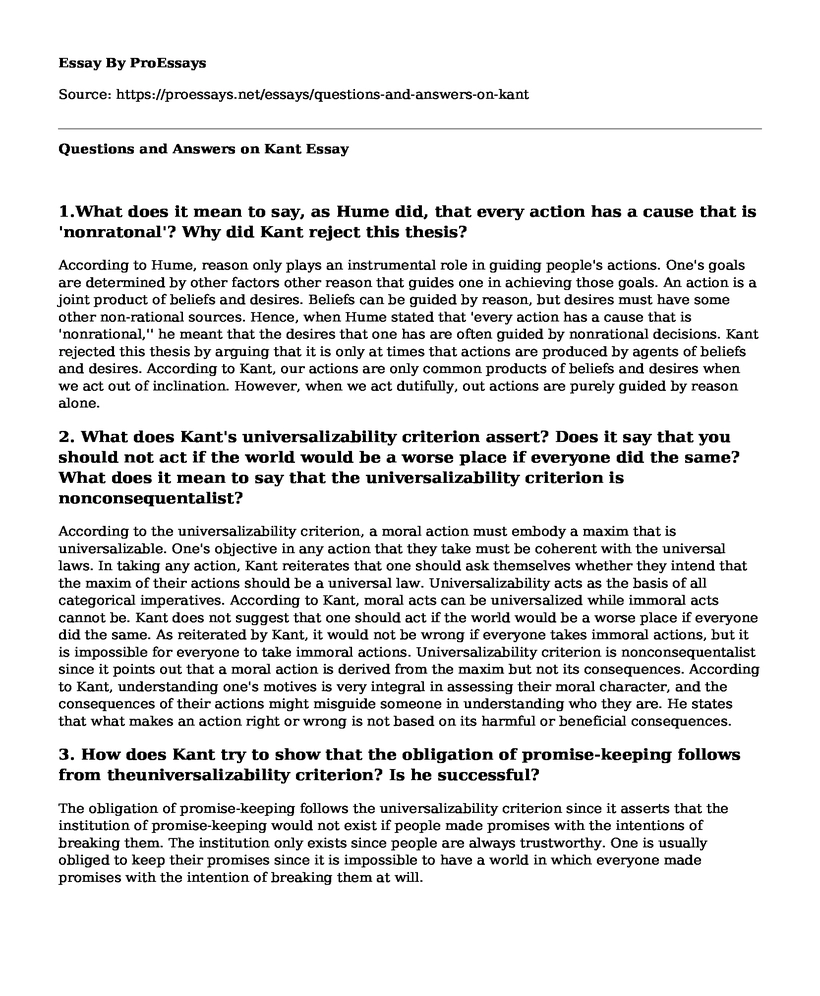1.What does it mean to say, as Hume did, that every action has a cause that is 'nonratonal'? Why did Kant reject this thesis?
According to Hume, reason only plays an instrumental role in guiding people's actions. One's goals are determined by other factors other reason that guides one in achieving those goals. An action is a joint product of beliefs and desires. Beliefs can be guided by reason, but desires must have some other non-rational sources. Hence, when Hume stated that 'every action has a cause that is 'nonrational,'' he meant that the desires that one has are often guided by nonrational decisions. Kant rejected this thesis by arguing that it is only at times that actions are produced by agents of beliefs and desires. According to Kant, our actions are only common products of beliefs and desires when we act out of inclination. However, when we act dutifully, out actions are purely guided by reason alone.
2. What does Kant's universalizability criterion assert? Does it say that you should not act if the world would be a worse place if everyone did the same? What does it mean to say that the universalizability criterion is nonconsequentalist?
According to the universalizability criterion, a moral action must embody a maxim that is universalizable. One's objective in any action that they take must be coherent with the universal laws. In taking any action, Kant reiterates that one should ask themselves whether they intend that the maxim of their actions should be a universal law. Universalizability acts as the basis of all categorical imperatives. According to Kant, moral acts can be universalized while immoral acts cannot be. Kant does not suggest that one should act if the world would be a worse place if everyone did the same. As reiterated by Kant, it would not be wrong if everyone takes immoral actions, but it is impossible for everyone to take immoral actions. Universalizability criterion is nonconsequentalist since it points out that a moral action is derived from the maxim but not its consequences. According to Kant, understanding one's motives is very integral in assessing their moral character, and the consequences of their actions might misguide someone in understanding who they are. He states that what makes an action right or wrong is not based on its harmful or beneficial consequences.
3. How does Kant try to show that the obligation of promise-keeping follows from theuniversalizability criterion? Is he successful?
The obligation of promise-keeping follows the universalizability criterion since it asserts that the institution of promise-keeping would not exist if people made promises with the intentions of breaking them. The institution only exists since people are always trustworthy. One is usually obliged to keep their promises since it is impossible to have a world in which everyone made promises with the intention of breaking them at will.
4. You are in a boat that is tipping dangerously to one side because all the passengers are on the right. You are considering whether it would be a good idea to move to the left. You as yourself, 'what would happen if everyone did this?' this question has an ambiguity in it. What is it? How is this ambiguity relevant to assessing Kant's universalizability criterion?
The question of 'what would happen if everyone did this?' seeks to understand the possibility of everyone being dutiful and moving to the left, assuming that their movement would affect the tipping of the boat. Kant's ethics of risking one's life for others centers on our duty. Hence, it is clear in this situation that I have to risk my life for others by moving to the left to balance the boat and prevent it from tipping. According to the universalizability criterion, a moral action must embody a maxim that is universalizable. Since the maxim of moving to the left to prevent the boat from tipping is a universal law, it would be very right to act since it would eventually save others from drowning.
Cite this page
Questions and Answers on Kant . (2022, May 09). Retrieved from https://proessays.net/essays/questions-and-answers-on-kant
If you are the original author of this essay and no longer wish to have it published on the ProEssays website, please click below to request its removal:
- Maxim Universalizability Essay Example
- Obedience to God and Morality Essay
- Race and Identity Essay Example
- Paper Example on Ethical Principles of Coventry University
- Essay Example on Magnimum: The Sweetest Yet Most Dangerous Person to Ever Exist
- Bioethics: A Global Concern for Human Beliefs & Values - Essay Sample
- Upholding Personal Ethics - Free Essay Example







